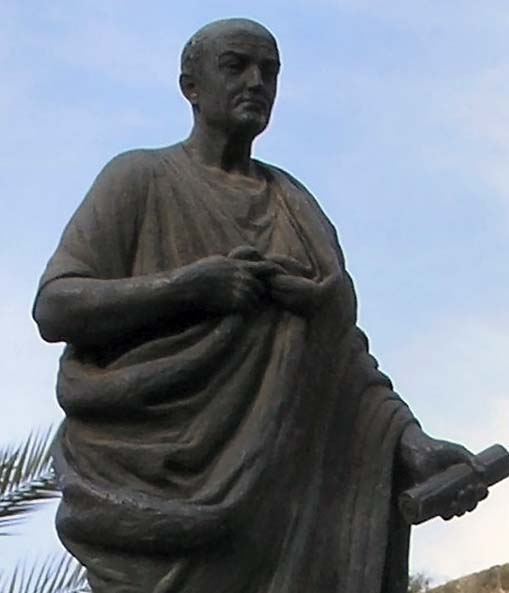Seneca the Younger: A Life of Stoicism, Politics, and Philosophy
Seneca the Younger, also known as Lucius Annaeus Seneca, was a Roman philosopher, statesman, and playwright whose influence has traversed the annals of Western thought. Born in Corduba (present-day Córdoba, Spain) around 4 BCE, Seneca became one of the most significant figures in Stoicism—a school of philosophy that emphasizes reason, self-control, and fortitude as a means to achieve a tranquil life—while simultaneously navigating the hazardous waters of Roman imperial politics.
The Early Life and Education of Seneca
Seneca was born into a prominent family renowned for their wealth and intellectual prowess. His father, Seneca the Elder, was a famed scholar and writer on rhetoric. From an early age, Seneca was steeped in an environment that cultivated a deep appreciation for literature and philosophy. The family relocated to Rome during Seneca’s youth, providing him with ample opportunity to study under the city’s foremost teachers.
His education was rigorous and comprehensive, emphasizing rhetoric, grammar, and the prevailing philosophical doctrines of the time. Stoicism resonated deeply with Seneca, and he became a committed adherent, aligning himself with the teachings of distinguished Stoics like Cleanthes and Chrysippus. These formative years forged the philosophical outlook that would underpin his influential writings and enable him to effectively counsel the political elite of his era.
Seneca's Political Ascent
Seneca’s career in politics began in the Roman Senate, where his eloquence and intellect swiftly garnered attention. However, his political trajectory was fraught with challenges and intrigue. Seneca’s association with influential figures such as Gaius Julius Vipsanius Agrippa and his growing prominence did not go unnoticed, and he soon entered the crosshairs of the imperial elite.
In 41 CE, under Emperor Caligula, Seneca narrowly escaped execution—a testament to the volatile and precarious nature of Roman political life. His fortunes waned once more in 41 CE, when he was accused of having an affair with Julia Livilla, the sister of Emperor Claudius. The allegations resulted in Seneca’s banishment to the island of Corsica, a period marked by both isolation and introspection.
During his eight-year exile, Seneca composed numerous essays and philosophical treatises, further developing his Stoic ideas. His writings addressed various themes, including the impermanence of life, the nature of happiness, and the virtues of equanimity in the face of adversity. Works like "Consolation to Helvia" and "Consolation to Polybius" illustrate his ability to synthesize personal experience with universal philosophical principles, providing guidance to those who sought solace during turbulent times.
Return to Imperial Favor
Seneca’s fortunes took a decisive turn with the ascension of Emperor Nero in 54 CE. Thanks to the intervention of Agrippina the Younger, Nero’s ambitious mother, Seneca was recalled to Rome and appointed as one of Nero’s principal advisors. This role placed Seneca at the epicenter of Roman power, albeit within a notoriously capricious regime.
As an advisor, Seneca wielded considerable influence over Nero’s initial policies, advocating for clemency, restraint, and the promotion of public welfare. Along with Sextus Afranius Burrus, the Praetorian Prefect, Seneca worked diligently to temper Nero's excesses and guide the youthful emperor toward a more enlightened rule. During this “quinquennium Neronis,” the first five years of Nero’s reign, Rome experienced a semblance of stability and prosperity—a testament to Seneca’s statesmanship and philosophical grounding.
While serving Nero, Seneca continued to write prolifically, producing works that remain staples of Stoic philosophy. His "Epistulae Morales ad Lucilium" (Moral Letters to Lucilius) is especially renowned, encapsulating a series of essays that explore vital aspects of Stoic ethics and practical wisdom. Through these letters, Seneca outlines a Stoic path to achieving a life infused with virtue, grounded reason, and inner peace, distancing oneself from the tumult of external circumstances.
The Decline and Fall
Despite his initial success, Seneca’s influence waned as Nero matured and became more erratic and despotic. The inherent instability of being a favored advisor in a capricious court increasingly jeopardized Seneca’s position. Personal enmities and rivalries surfaced, and despite his attempts to retire from public life, Seneca remained ensnared in imperial intrigues.
The denouement of Seneca's political career came in 65 CE when his involvement in the Pisonian Conspiracy—a plot to assassinate Nero—was alleged. Whether Seneca was genuinely complicit remains a matter of historical debate, but the consequences were stark: faced with execution, he was compelled to commit suicide. True to his Stoic beliefs, Seneca met his end with composed dignity, leaving behind a legacy that would echo through the intellectual currents of Western civilization.
In conclusion, Seneca the Younger's life encapsulates the complex interplay of philosophy and politics in ancient Rome. His literary corpus continues to inspire and provoke thought, while his personal story is a poignant testament to both the potential and perils of intellectual engagement within the realm of power. As Seneca once wrote, "True happiness is to enjoy the present, without anxious dependence upon the future." His unwavering Stoicism remains a profound guide to navigating the vicissitudes of human existence.
The Philosophical Works and Legacy of Seneca
Seneca the Younger's contributions to Stoic philosophy are both enduring and multifaceted, cementing his status as one of antiquity's most profound thinkers. His philosophical works, composed during periods of both political favor and personal adversity, offer timeless insights into the human condition. They explore the dimensions of resilience, the pursuit of virtue, and the necessity of reasoned judgment in an often chaotic world.
A distinctive feature of Seneca’s writing is his ability to blend practical guidance with philosophical discourse. In "De Brevitate Vitae" ("On the Shortness of Life"), Seneca emphasizes the fleeting nature of human existence—a central tenet of Stoic thought. Rather than mourning the swift passage of time, he advocates for the mindful and purposeful engagement with life’s pursuits. Seneca encourages readers to focus on what genuinely matters, suggesting that the majority of our anxieties stem from misplaced priorities and an overemphasis on external validation.
Another pivotal work, "De Tranquillitate Animi" ("On the Tranquility of the Mind"), delves into achieving mental serenity amidst life's inevitable challenges. Seneca posits that true peace of mind arises from aligning one's desires with reason and consciously limiting the pursuit of external pleasures. By internalizing Stoic principles, individuals can cultivate a state of tranquility impervious to the fluctuations of fortune, enabling them to weather personal and societal vicissitudes without succumbing to distress.
Seneca's Views on Ethics and Morality
Seneca's writings are not merely philosophical abstractions; they serve as ethical guideposts applicable to everyday life. His work "De Ira" ("On Anger") dissects the destructive power of anger, a theme particularly relevant in the turbulent environment of Roman politics. Seneca perceives anger as a temporary madness that can cloud judgment, damage relationships, and provoke irrational actions. By advocating for control over one’s emotions, Seneca aligns with Stoic ideals that prioritize rationality and emotional resilience.
Central to Seneca’s ethical viewpoint is the notion of living in accordance with nature and reason. He emphasizes moral integrity and the development of personal virtue as prerequisites for true happiness. Seneca argues that external circumstances, such as wealth, power, or social status, are indifferent, neither inherently good nor bad. Instead, the pursuit of virtue—not the pursuit of pleasure or avoidance of pain—is the primary path to a fulfilling and meaningful life.
His extensive correspondence with Lucilius, captured in the "Epistulae Morales ad Lucilium," further illustrates Seneca’s ethical doctrines. Through these letters, he addresses subjects ranging from friendship and self-improvement to the nature of death and the acceptance of fate. Seneca’s conversational tone and accessible insights make these letters enduring resources for anyone seeking philosophical counsel in their personal journey.
Tragedy and Theatre: Seneca’s Literary Contributions
Seneca's influence extends beyond philosophy into the realm of literature, particularly through his contributions as a playwright. His surviving tragedies, which include works like "Phaedra," "Thyestes," and "Medea," are among the few examples of Roman dramatic literature that have endured through the centuries. These tragedies are characterized by their philosophical profundity, psychological insight, and exploration of human passions and conflicts.
Seneca’s tragedies delve into themes of revenge, power, and the destructive effects of uncontrolled emotions. The characters within his plays often grapple with moral dilemmas and existential questions, reflecting the Stoic belief in the importance of inner strength and ethical clarity. His portrayal of intense psychological drama not only entertained Roman audiences but also engaged them in contemplating Stoic values.
While Seneca’s tragic works are written in a stylistic and rhetorical manner consistent with the Roman tradition, they are also known for influencing later European literature, particularly during the Renaissance. The emotional intensity and moral complexities presented in his tragedies provided a template for subsequent playwrights, including William Shakespeare, who drew inspiration from Senecan themes and structures.
Enduring Influence and Modern Relevance
Seneca’s philosophical and literary contributions have transcended the confines of ancient Rome, resonating across diverse epochs and intellectual movements. His detailed examination of human nature and insights into ethical conduct continue to inform contemporary discourse on philosophy and psychology. The Stoic emphasis on self-governance, endurance, and the acceptance of life’s uncertainties is particularly relevant in today’s fast-paced and often unpredictable world.
Modern practitioners of Stoicism draw heavily from Seneca’s works, advocating for his teachings as a framework for achieving personal resilience and emotional balance. His focus on mindfulness, self-reflection, and rational decision-making is echoed in modern self-help and cognitive behavioral practices. Seneca’s emphasis on ethical living as a pathway to fulfillment and his articulation of universal human concerns ensure that his writings remain pertinent across cultures and generations.
Seneca’s life story also serves as a cautionary tale about the dangers of political ambition and the balance between public service and personal integrity. His tumultuous experiences underscore the complexity of navigating power dynamics while striving to remain true to one's principles. Despite the passage of millennia, Seneca’s reflections continue to offer guidance to individuals seeking wisdom amidst the chaos of modern life, affirming his timeless claim: "As is a tale, so is life: not how long it is, but how good it is, is what matters."
Seneca's Views on Wealth and Materialism
A notable aspect of Seneca’s teachings is his perspective on wealth and material possessions. As a wealthy Roman and advisor to emperors, Seneca was acutely aware of the potentially corrosive effects of affluence on the soul. Despite his personal wealth, he maintained a philosophical stance that valued simplicity and modesty over luxury and ostentation.
In "De Vita Beata" ("On the Happy Life"), Seneca challenges the prevailing notion that wealth equates to happiness. He argues that the pursuit of material possessions often leads to an insatiable cycle of desire and dissatisfaction. True happiness, according to Seneca, arises from inner virtues and the cultivation of wisdom, not from the accumulation of riches. He posits that a life governed by simplicity and contentment with what one has is far superior to one driven by ceaseless ambition for more.
Seneca’s own life presents a paradox in this regard. He amassed substantial wealth during his political career, yet he consistently advocated for the Stoic ideal of equanimity in the face of material gain or loss. This duality provides fertile ground for scholars and philosophers, who grapple with the complexities of Seneca’s personal adherence to the Stoic doctrines he espoused.
Seneca's Thoughts on Time and Mortality
Seneca’s reflections on time and mortality reveal profound insights about the temporality of life and the importance of living meaningfully. In "De Brevitate Vitae" ("On the Shortness of Life"), he underscores the urgency of embracing the present, admonishing those who squander their time on trivial pursuits. To Seneca, time is our most precious resource, and its conscious management is crucial to leading a purposeful existence.
His letters and essays invite readers to face mortality with courage and acceptance. Unlike many of his contemporaries, Seneca does not view death as a tragedy to be feared but rather as a natural and inevitable transition. In "Ad Lucilium Epistulae Morales," he advises that by contemplating death and accepting its certainty, one can liberate oneself from the anxiety that often accompanies the unknown.
Seneca’s meditations on mortality encourage living with intention and mindfulness, urging individuals to prioritize personal growth, ethical behavior, and relationships over transient pleasures. Such perspectives resonate deeply in a modern context, where the timeless question of how to live meaningfully persists amidst the distractions of contemporary life.
Modern Stoicism and Seneca's Influence
The resurgence of interest in Stoicism in the 21st century highlights the enduring relevance of Seneca’s teachings. Modern proponents of Stoicism draw upon his writings to navigate the complexities of personal and professional life. Seneca’s practical wisdom, especially regarding emotional resilience, has found a contemporary audience among those seeking clarity in a world often marked by uncertainty and change.
The minimalist lifestyle movement, which emphasizes decluttering both physical and mental spaces, echoes Seneca’s advocacy for simplicity and focus on intrinsic rather than extrinsic rewards. His insights on wellness—balancing aspirations with contentment—continue to inform self-help literature and mindfulness practices.
Moreover, Seneca’s approach to ethics—prioritizing integrity, duty, and a commitment to the greater good—finds resonance in modern discussions of leadership and corporate responsibility. As businesses and leaders strive to operate with conscience and accountability, the Stoic virtues Seneca championed serve as a foundational blueprint for ethical decision-making and sustainable success.
Seneca’s emphasis on the examined life, as articulated through his philosophical proclamations and literary flair, demonstrates an unending appeal. His philosophical corpus remains a beacon for those seeking guidance on how to live with wisdom, dignity, and purpose in an ever-evolving world.
Conclusion: The Timeless Legacy of Seneca the Younger
Seneca the Younger stands as a monumental figure whose life, philosophy, and literary accomplishments reverberate through history. His blend of Stoic philosophy with practical insights offers invaluable guidance across the diverse spheres of ethical living, personal development, and intellectual inquiry. Through the probing depth of his essays, tragedies, and letters, Seneca provides a roadmap for navigating the challenges of human existence, from the mundane to the monumental.
In examining Seneca's legacy, one encounters the timeless universality of his teachings. His advocacy for reason, virtue, and emotional fortitude speaks across eras, providing crucial wisdom for coping with adversity while fostering personal and communal harmony. As the world continues to confront its own vicissitudes, the philosophical foundations laid down by Seneca the Younger will persist as a guiding light for generations seeking a life of meaning and purpose. His profound observation aptly encapsulates the essence of his approach: "Begin at once to live, and count each separate day as a separate life." Through such enduring insights, Seneca's voice remains vital and compelling, echoing down the corridors of time with principles that transcend the circumstances of his own life.













Comments